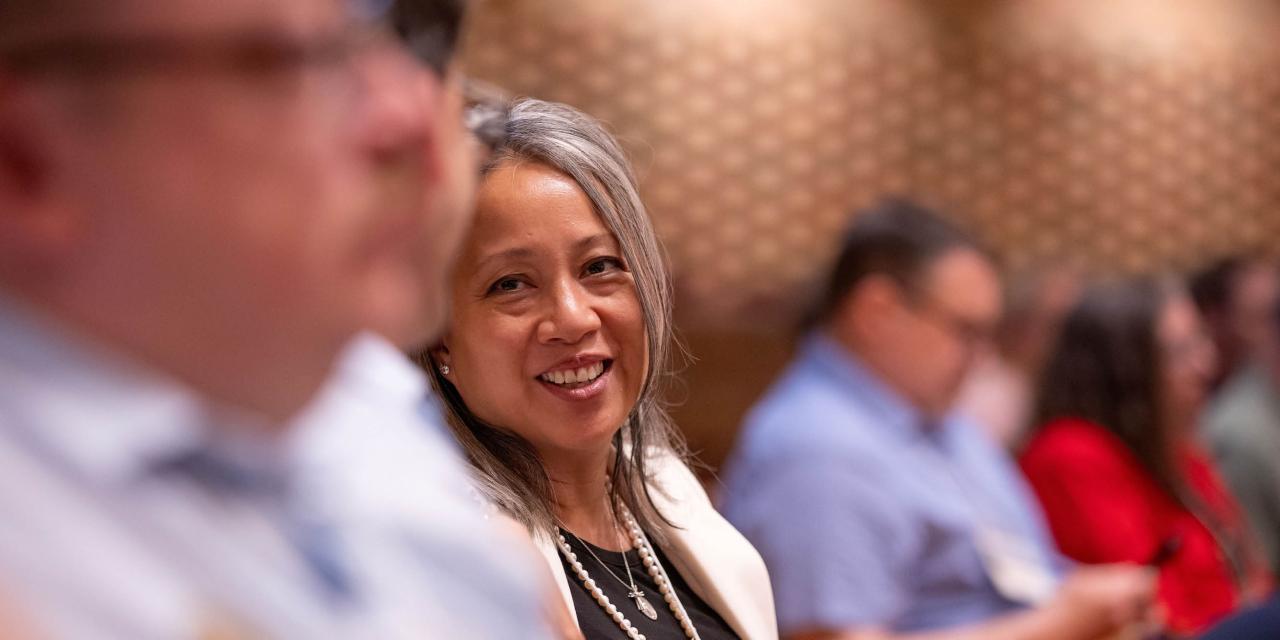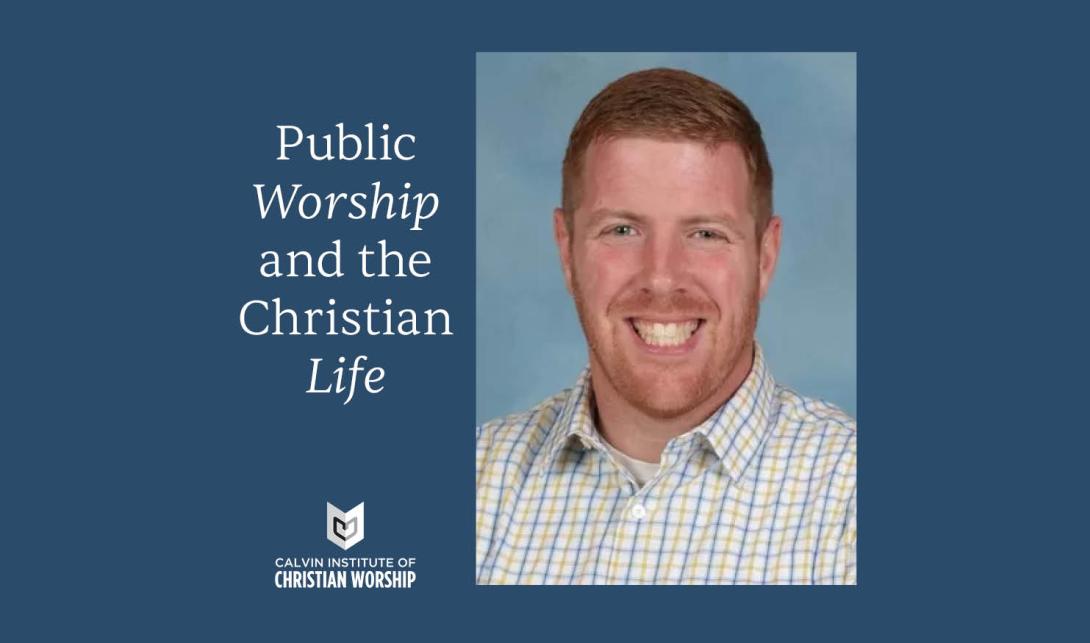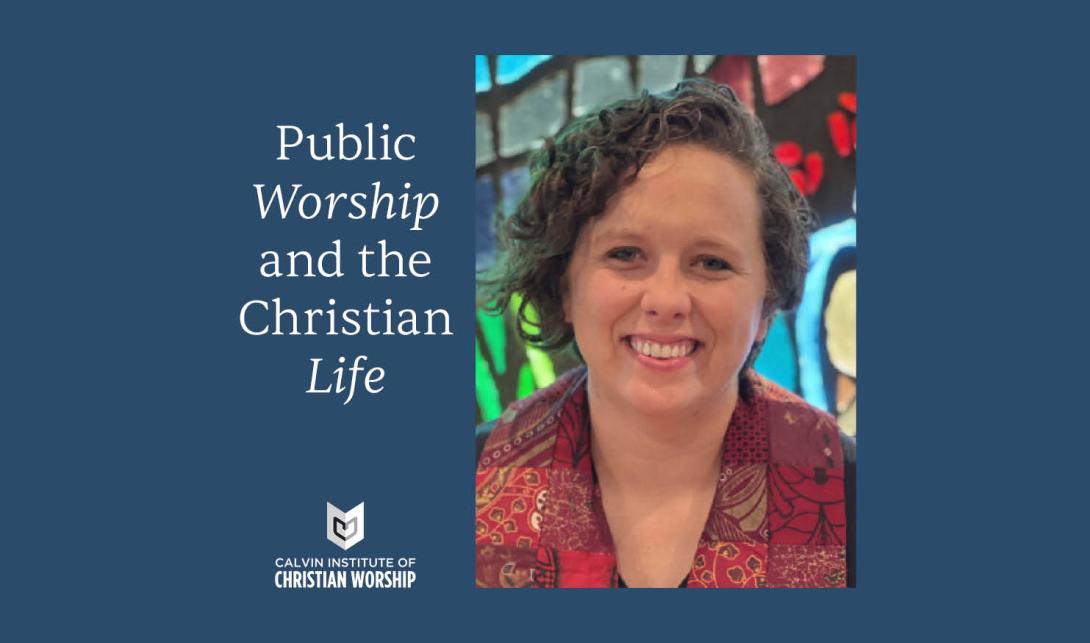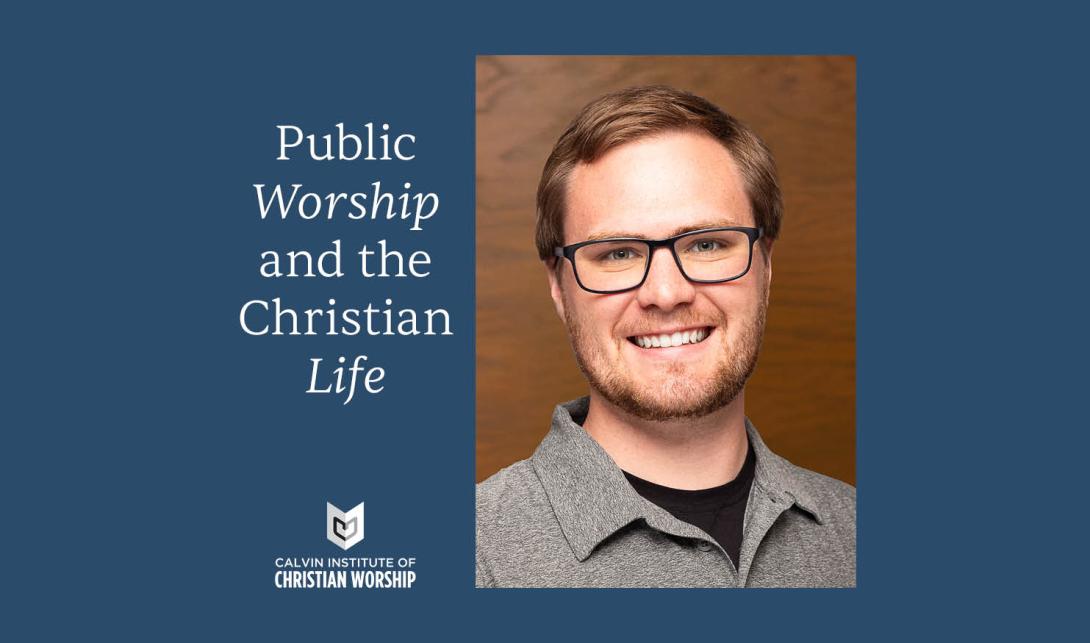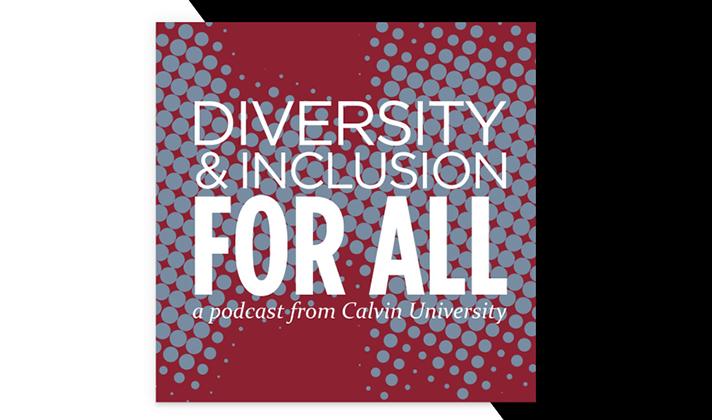Host [00:00:02] Welcome to Public Worship and the Christian Life, a podcast by the Calvin Institute of Christian Worship that explores connections between the public worship practices of congregations and the dynamics of Christian life and witness in a variety of contexts. Our conversation partners represent many areas of expertise and a range of Christian traditions offering insights to challenge us as we discern the shape of faithful worship and witness in our own communities. In season three, we focus on ministry alongside youth by exploring five themes: youth agency, theological questions, the role of families and parents, intergenerational community, and multiple pathways for youth.
Kristen Verhulst [00:00:58] Hi, Sarah Farmer. It's so great to have you on the podcast today. Thanks for joining me.
Sarah Farmer [00:01:03] Thank you for the invitation.
Kristen Verhulst [00:01:05] Today I am talking with Sarah Farmer, who is assistant professor in the department of theology and ministry at Indiana Wesleyan University. She teaches in the areas of faith formation, youth ministry, and transformative pedagogy. Among many other accomplishments, Sarah cofounded the Youth Arts and Peace Camp in Chester, Pennsylvania, and worked with the Youth Hope Builders Academy at Interdenominational Theological Center in Atlanta. She is coauthor with Anne Streaty Wimberly of Raising Hope: 4 Paths to Courageous Living for Black Youth. And that will be the topic of our conversation today. So thanks so much, Sarah.
Sarah Farmer [00:01:54] Absolutely.
Kristen Verhulst [00:01:56] So in my work here at the Calvin Institute of Christian Worship—and my name, for our listeners, is Kristen Verhulst—we are exploring the intersections of public worship, youth participation, and faith formation, each of which are distinct areas of focus for congregations and parishes and ministries, but ideally, we trust, they're never separated. So as we explore this in our work here, we'd like to talk about your book and especially look at your book through the lenses of youth agency, space for question asking, role of parents and families, intergenerational community, and the last theme, multiple pathways for youth. Let's begin, if we may, with having you tell us the story behind the book. Why did you and Anne write it?
Sarah Farmer [00:02:54] Absolutely, and sorry that Anne couldn't be here. But she has been in this work for a really, really long time. I respect her as a mentor and as an elder in many ways. Hope is part of her story. I was invited to be part of Youth Hope Builders Academy, which is really where the story emerges from; this book emerges from as an MDiv student, and it continued throughout my PhD program to be involved in the work of Youth Hope Builders Academy, which is the Lilly-funded program where . . . at the time we were inviting young people, particularly Black youth, onto the campus and to a retreat center so that we could explore questions around vocational discernment, and we added also things like conflict transformation and identity formation. And [we] really were intrigued by the questions that the young people were asking, but in particular the questions that Black youth were raising. We felt really honored to be working with Black youth and felt like there wasn't much out there that really talked about the experience from the lens of working with Black youth. And so that's kind of why we wrote the book.
Kristen Verhulst [00:04:12] Wonderful. And what have you been learning along the way from your readers and people that perhaps have been writing reviews of the book?
Sarah Farmer [00:04:21] First of all, I'm always surprised that people are reading it. After I get over the initial surprise, I think that the people really want and need people of color to be writing about the human experience. And I feel like what I'm learning from readers is people really do want a lens to peer into the experience of people of color. And to hope is human, so I realize that as people read, they realize that . . . even though it’s talking about it from a particular lens, some of the things we talk about around hope—hope is an empowering attitude; hope is a disposition, a faith-filled posture in life’s wilderness—that this isn't just things that youth of color experience. This is the human experience: that people face challenges and need hope. And I think that this book provides a resource not just for youth of color, but also for all youth. I think that's been really affirming to hear that.
Kristen Verhulst [00:05:29] And I think that this focus on hope very much leads into that first theme, which is youth agency. So what would you say? You're encouraging young people, and then those of us who mentor and lead young people, to find their voice, to find this hope-centered, hope-infused life. What are you encouraging or calling out?
Sarah Farmer [00:05:57] I think I'm calling out the need for courage and the need for bravery. I think one of the things I realize is that sometimes hope can be seen as abstract. It could be seen as naive and even flighty. But to have the audacity to hope, it does require a level of courage, especially when you live a life where you face a lot of disappointment. And when you face disappointment or frustration or, in the context of these past few years, you keep seeing people killed on the street, Black people killed on the street by people who should be protecting them, sometimes it’s hard to hope in the goodness of the world; it’s hard to hope in the goodness of people. And I think that part of what we're trying to invite people to is, yes, it takes courage, but we're inviting them into a larger story. This story of courage is the legacy that we have, particularly as people of color. We have this legacy in which our forebears kind of already carried this torch. And so this is a torch that we do not carry alone. We have a cloud of witnesses that have gone before us. We can do this because we've done it before. We just have to reach into the wells of our heritage. . . . And so I think in some ways, this is inviting young people to do that, but is also inviting those who walk alongside young people to do that as well, that it takes courage to walk alongside young people. Young people can be scary! I think about all the times I'm about to preach in front of young people, and I feel like I tense up more when I'm about to speak in front of young people than I do adults, because sometimes I think for us we have all these myths and notions about what young people think about adults in our heads. . . . That is a myth; it’s not true. And so I think that that's part of the invitation: it takes courage to do it, but we're inviting you to do it because our young people need agents of hope. They need people to walk alongside them and companions on this journey.
Kristen Verhulst [00:08:24] I love that idea of in order to help the youth find their own voice, it's hearing and knowing the stories of their ancestors, of who has gone before them and has paved the way and at least given them some beacons of light to look toward and hopefully inspire some courage, even in the difficult times. What about this idea about making space for asking questions? So, like you said, sometimes youth can be scary and it might seem easier [to] tell them what to do. But I think in building a sense of hope and agency there has to be some room for really listening to those deep, difficult questions that the young people want to talk about. How can you help especially the mentors and youth ministers lean into the idea of making space for questions?
Sarah Farmer [00:09:25] I think it’s so much about the environment we create, that it’s all about what Parker Palmer talks about: creating spaces all the time. It’s all about the type of space we create. And I think one is that we have to create a failsafe where young people feel like they can take risks. Because anytime you're asking questions, there is a level of risk involved, and that could be from your peers, but they also could be from the adults or the mentors who are asking the question, especially if those questions are messy questions. We have to create spaces that young people feel comfortable failing in and not feel like they're going to be judged or not feel like they're going to be ostracized or not feel like they're going to be excluded and not feel like they're going to be made fun of. So sometimes creating that space is not only about us and our response to them, but it's also about . . . the process we set forth for the young people who will also be interacting in that space, . . . courageous space. We've talked about courage; for some young people the space will never be safe. It just will never be safe. When one person feels safe, sometimes it automatically makes another person at risk. And so not just a failsafe space, but a courageous space where people kind of anticipate discomfort. That discomfort is part of the process of asking and exploring questions. I think a trustful space where young people know, too, where we model what it means to ask questions. One of my mentors, Carol Lakey Hess, who invested in me as a mentor when I was going through my PhD program, she always talks about we don't do questioning and answering, but we do questioning and wrestling, and that sometimes part of what you're creating is this space where young people can wrestle with God, and that they know that it's okay to wrestle with God. So to let them know we're lifelong wrestlers, we engage this process because of the difficult realities that we face every day. And we don't understand—like, who knew a pandemic was going to hit? I mean, we're talking about big stuff right now, like what's going on with Ukraine and Russia. Young people are asking questions, and younger and younger. So it's like we have to be able to ask those questions or our young people are going to walk away from God if we don't create the spaces where they can ask the questions. And so I think it’s the environment we create. I also think it’s also encouraging some internal resilience in them; it’s the character we help them build and inform in those spaces as part of that process, reminding them that discomfort is part of the process. I think sometimes in American culture we idolize convenience and comfort. But for young people, this is part of the process of wrestling, it’s part of the process of becoming more aware of yourself, of becoming closer to God. You have to accept that that's part of it. Making mistakes is part of the process. You might say something that is wrong, but creating the space where people can do that. Making mistakes is part of the process. And they also feel bravery and courage. So the type of space we create: failsafe, courageous, and trustful. You’ve also got to encourage and invite them and guide them and model for them what it means to actually live into that type of space.
Kristen Verhulst [00:13:09] Well, that just brings me really nicely into the role of family— parents, but also grandparents, aunts, uncles, other significant adults in the lives of young people. What encouragement do you have to these very significant adults, especially when they're feeling the weight of the world, of all of these things we just mentioned. But what might you say to encourage these important adult figures in young people's lives to help encourage or sustain these hope-oriented lives?
Sarah Farmer [00:13:54] I think one of the the best feelings for a young person is to know that they are fully loved, fully valued, and that they can feel the support and affirmation, that they have a place to go when it gets really dark, and they have a place to go to celebrate—that they have a place to go. . . . I feel like that's what families and parents and other caring adults become for young people. They become a place where young people know they can go when things get really rough, when they're at the end of themselves. I think knowing that should be empowering for adults, that sometimes it is intentional and sometimes it is the formal structures, but to recognize that just being around you is formative for young people. Just you being you and you doing what you do, which is loving them, is formative in your own way. You don't have to try to become something you're not so that you're trying to fit in, be cool and all that. You being who you are is who they need. I didn't realize this really until . . . being at the university and being at a university where I started seeing so many of my students at the church I went to. It was great. And I started to . . . really [show] an interest in why they are there. And they really wanted to be around families. They wanted to be in small groups where they were with other families as opposed to college-aged small groups, which is what I would have assumed: that they want to be with their own peers. They’re like, “We’re with our own peers all the time on campus. We want to be around families. We want to see children. Children make us happy.” So I think this idea around the importance of, one, recognizing that we [should] just be our full selves, including acknowledging our imperfections and actually sharing about the bumps along the road and providing those spaces of sharing story. Because in that you bear witness to those before you so that space becomes really formative just hanging out with young people.
Kristen Verhulst [00:16:27] Yeah, those intergenerational connections, those are significant, aren't they. Both upward, with grandparents or older adults, but also with younger children too. And it is sometimes discouraging when you see churches want to quickly separate by age groups, whereas there's so much learning we can do together among the ages.
Host [00:16:52] You are listening to Public Worship and the Christian Life: Conversations for the Journey, a podcast produced by the Calvin Institute of Christian Worship. Check out our website at worship.calvin.edu for resources related to this topic and many other aspects of public worship.
Kristen Verhulst [00:17:21] Anything from the camps that you saw around that intergenerational connection that was especially powerful?
Sarah Farmer [00:17:31] I think one of the most powerful moments—and I think it happened every single year in Youth Hope Builders Academy, because we did have a very intergenerational staff; Dr. Wimberly is in her eighties, and of course I was coming in newly minted as a graduate student, and then I had older women. . . . We had other staff, but we were a very intergenerational group of people. But the moment in the camp that was so powerful every year was when Dr. Wimberly would share her testimony, and she would share her testimony of losing her children, having a miscarriage and actually at one point having a stillbirth. And basically she would say, “All of you are my children.” And she would claim them, and they would claim her. And there would be some tears shed because it was a moment where their families were being expanded. And if you know anything about Dr. Anne, that's exactly how she is. . . . Her presence is welcoming and affirming—just her presence. When she says something, that takes it to the next level, but just her presence. So I think that what the young people gained from that space is they gain more family. One of the rich things about Youth Hope Builders Academy also is we would do rituals. When they got their shirts, for instance, it was a ritual involved. Dr. Anne was the queen of rituals. There was a ritual involved when they got their shirts and she would talk about what it means to wear this shirt. You're not just wearing this shirt because you're part of this program, but you're representing something. You're bearing witness. And I think that's what our grandparents and the intergenerational community offers, and being part of community offers, is that you're not just bearing witness for the sake of self, but what you say says something about our community, and it matters what you do when you're outside of this community. When I think about the camps, I always talk about wells to dig from. And when you become part of another family, the well expands. You can dig deeper and deeper and deeper to get the resources you need to live today.
Kristen Verhulst [00:20:21] I like that a lot. And too, when you join into a new family or make a new relationship, in that exploration you also, I think, learn something new about yourself that wasn't really evident to you until you made these new relationships or new connections. That's great. So the title of your book is Raising Hope: 4 Paths to Courageous Living, and I wonder if you could just briefly mention those four paths, but then is there one particular pathway that you feel is particularly promising right now in this this particular cultural moment just coming out of a pandemic, a war, here in our own United States the continued, endless, systematic racism that goes on. Any particular pathway that you feel could really make a difference for young people right now?
Sarah Farmer [00:21:20] So we talk about soul sharing, which is really about sharing story. A story is sacred in the ways in which you can name the world through story. We also talk about creative expression, which is really around art, but the ways in which that can be truth telling; it can create a space for a community and also a space for agency. We talk about awareness, which is really all about access, right? Providing enrichment opportunities so that students of color can bridge, but they also can just gain access to networks—political, social, academic, even physical networks that they don't have. But with your question, the one thing I would say is the fourth pathway, which is about conflict transformation, which is the recognition that violence happens at all levels: personal, interpersonal, and structural. So when we think about violence, it is the whole person. It is holistic, happening to all these layers and all these different ways to young people, to communities. And so the thing I like about this pathway is it's helping us think about conflict transformation, which is not resolving conflict, it’s not pretending conflict doesn't exist, but it’s saying, how can we transform the violence or the racism, or how can we transform what's happening so that we grow from it rather than—you get wounded, but rather than be so wounded, we get stuck in a place that paralyzes us from moving forward. And so in this sense, we're thinking about that conflict transformation invites us into truth seeking and and even forgiveness and practices perhaps even of reconciliation with self, that there are things about ourselves that we discover when challenges like what's happening in the world take place. There's a lot of things we discovered about ourselves during the pandemic. . . . And then just this idea around truth sharing, where it's important for us to be able to speak truth in love with others, and for that voice, which is what we're talking about, to be able to move people to action, to act on our behalf and not be silenced by what's happening. And I think also this idea around lament, which I think so many of us had to do for our own soul care. We had to be able to lament. Everybody’s exhausted; everybody's busy. We had to be able to question and ask God about why was all this stuff happening? God, where are you? And know there is a safe place to do that, that as we ask God questions like that, it actually draws us closer to God, that we can doubt faithfully. And then just this idea of repairing the world and that as we tend to our external or internal conflicts, that impacts the self (and) others in our ideal image of God, that we begin to move in a way that transforms the world.
Kristen Verhulst [00:24:54] Yeah. I'm so glad you mentioned lament, because I think that's the place where public worship, where corporate worship practices can really connect here, that we have to make room to lament the deep pain and evil of this world, this life. But we don't have to stop there. I mean, we do have to lament, but then we can move into the beautiful hope we have in reconciliation. But I think sometimes some church communities aren't willing to just let people kind of live in that lament moment for a bit and to recognize that's an important part of the process, naming the pain and the “Why, God?”
Sarah Farmer [00:25:43] I think it’s only through the process of lament that true repentance can happen, because lament not only recognizes the pain of those who have been wounded, but it invites those who have been participants or even complicit in the wounding to also say that there was something wrong and that it gives them space to say we want to do something different and we can be allies in the repairing of the world that that's before us.
Kristen Verhulst [00:26:19] Yeah, that's great. Sarah, it's been great talking with you. As we wrap up this time, what final words of blessing or encouragement would you have, first for young people, but then also for those adults who care for them, love them, want to see them thrive and to find hope.
Sarah Farmer [00:26:42] I would say for the young people that there is a lot to deconstruct in this world. There is a lot to name and identify and say that this isn't okay, this is wrong. I think it’s okay, but I don't want you to stop at deconstructing because when you stop at deconstruction you can get stuck in a place where it's really hard to see hope and it's hard to see where God is still at work. And so even as you begin to deconstruct, build communities that will help you reconstruct your faith, reconstruct your life, reconstruct your world. Find people that you trust that will help you live into a reality that is not just about what should be, but that is inviting you into creating the world that could be through your participation and agency in that world. And then for adults or for mentors of young people, I would say just remember that young people want us; do not believe the lie that they do not need us or they don't want us. They need us. And they desperately want us. I hear so many young people saying, “Where are the adults that want to invest in me?” And then I hear so many adults saying, “I'm scared,” or “They don't want us. They think we’re too old or we don't have anything to offer.” And that is just not true. We have to bridge the gap. But even as you look to bridge that gap, be sure to tend to your own soul. Care for your own soul. Because what we don't want to do is take the trauma that we've experienced and project that onto the young people. And so, as you tend to them, also tend to your own soul.
Kristen Verhulst [00:28:40] Thank you so much, Sarah Farmer, for talking with me today.
Sarah Farmer [00:28:44] Thank you. Thank you for the opportunity.
Kristen Verhulst [00:28:48] Thanks for listening. We invite you to visit our website at worship.calvin.edu to learn more about the Calvin Institute of Christian Worship, an interdisciplinary study and ministry center dedicated to the scholarly study of the theology, history, and practice of Christian worship and the renewal of worship in worshiping communities across North America and beyond.
